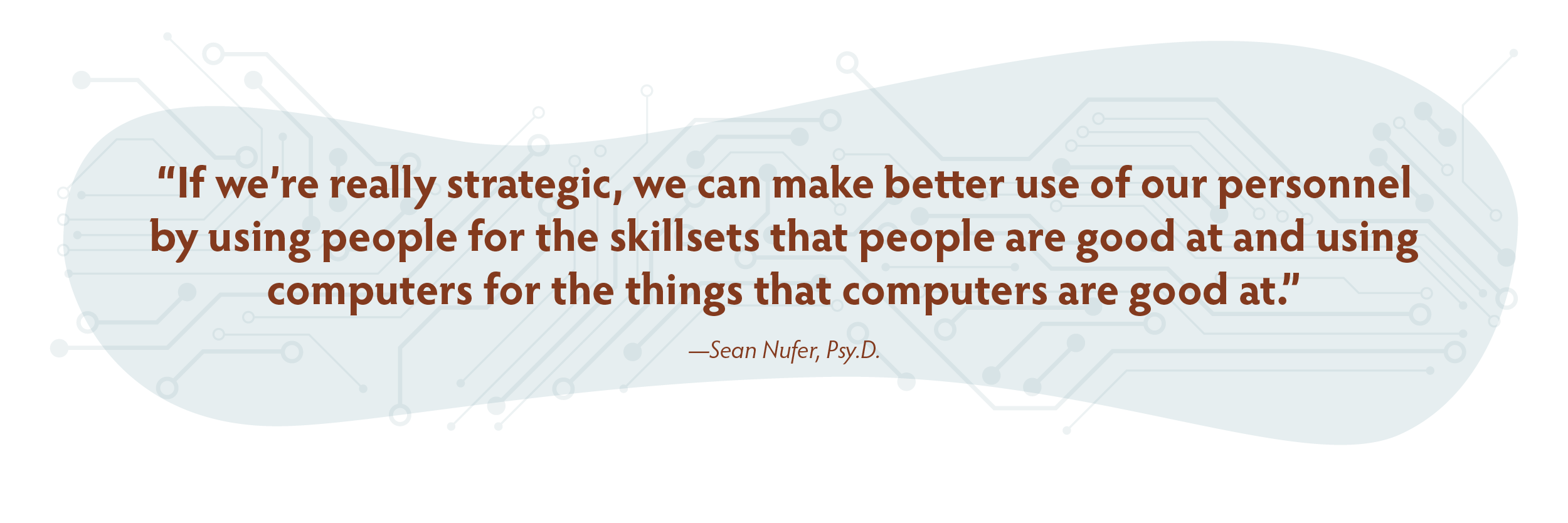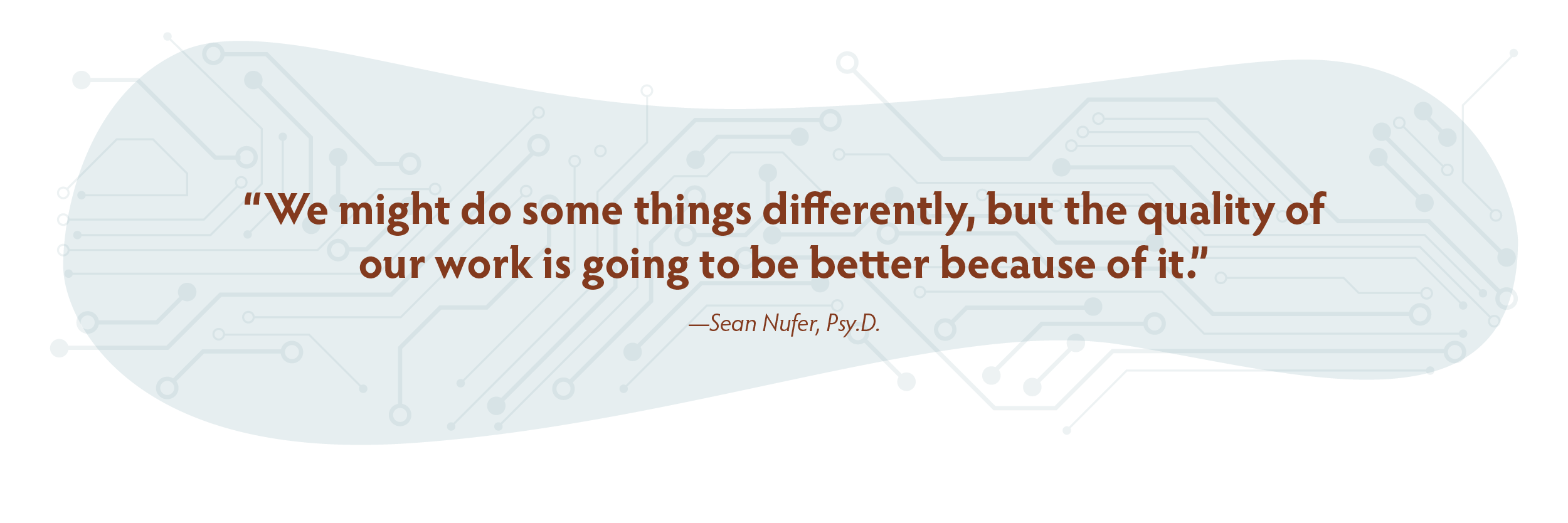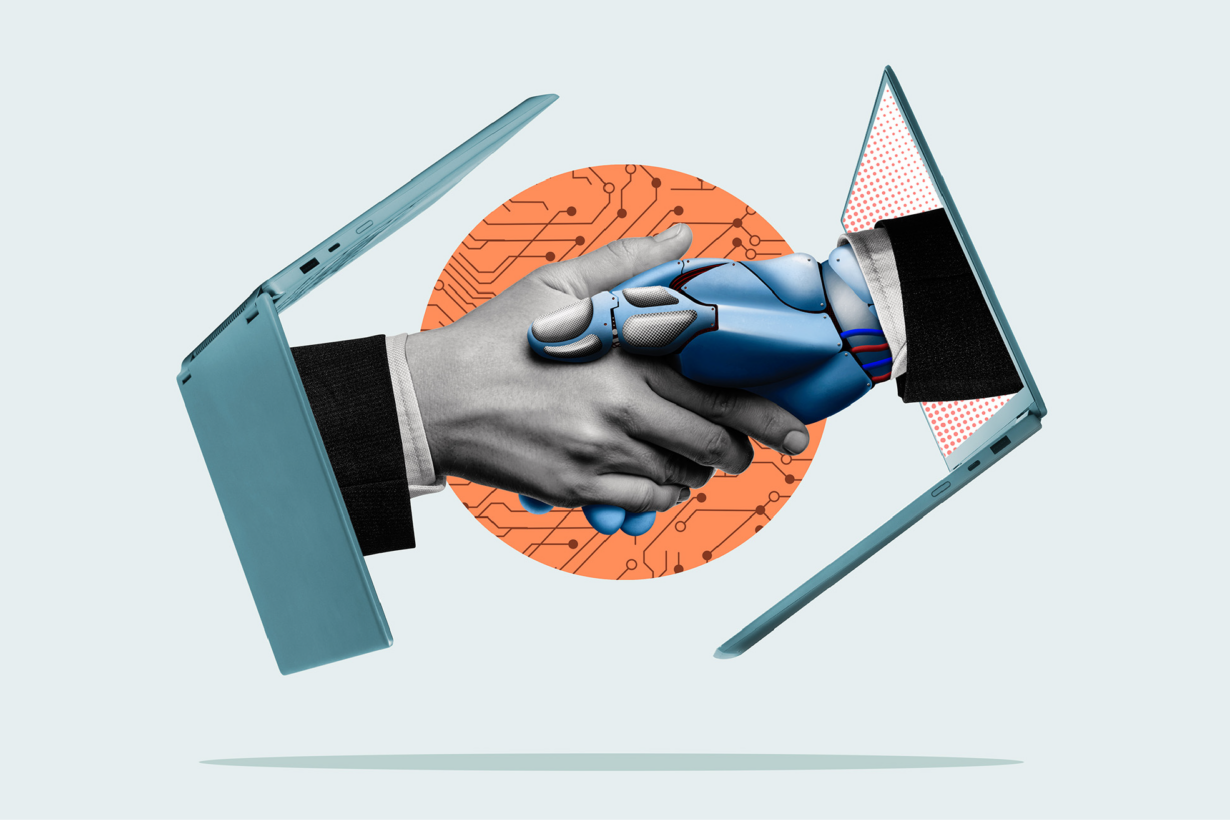Artificial intelligence (AI) may be just the latest in a long history of transformational business tools and technologies, but this time feels different. Though the concept of AI has existed for decades, it was long thought of as an inevitable advancement to which evolving technologies would lead us sometime in the future.
Now the future is here.
In the last couple of years, development of and widespread interest in generative AI has exploded in ways that have revolutionized how the people live their professional and personal lives. Perhaps not since widespread adoption of the internet some 30 years ago has technological change felt as instantaneous and profound not just for one sector, such as technology or professional services, but for everyone, everywhere.
“AI is going to affect every single industry,” says Sean Nufer, Psy.D., senior director of teaching and learning at The Community Solution Education System and a graduate of the business psychology program at The Chicago School, where he’s now a senior adjunct professor. “It doesn’t matter if you’re a hairdresser, a marketer, an educator or even a plumber. Somehow, generative technology will impact your profession.”
That includes psychologists in general and business and industrial and organizational (I/O) psychologists in particular according to Dr. Nufer, who has been studying generative AI and training educators how to use it since the debut of ChatGPT in November 2022. In that time, he’s come to an important conclusion about AI’s impact on workers and businesses: Generative AI won’t dehumanize work, he suggests. Instead, by empowering business and I/O psychologists to be more efficient and effective, it might actually make workplaces more human instead of less.

What Is Generative AI?
Based on large language models—machine learning algorithms that computer scientists have taught to identify, comprehend, and create content by ingesting gargantuan amounts of training data—generative AI can write essays, songs, and software code; develop new recipes and personalized exercise plans; convert currency and translate foreign languages; solve complex math and science problems; and even plan a travel itinerary for your next European vacation.
Generative AI isn’t just fun and games, though. In the business domains where business and I/O psychologists work, generative AI can drive real, positive business outcomes according to Dr. Nufer.
A promising use case for business and I/O psychologists, in particular, is data collection and analysis. “If you were to run an employee engagement survey, for example, and get a dataset back … generative technology might be able to help you identify certain patterns and insights, or at least guide you in a certain direction so that you can make more observations and report on them,” Dr. Nufer explains. “It’s not going to be the end of your analysis, but it could be an additional step in the analytic process to help you identify something you didn’t see, reinforce something that you did see or inspire you to look in a different direction than what you had considered previously.”
That sort of analysis could be especially useful in change-management contexts: During times of organizational change, business and I/O psychologists equipped with generative AI could analyze historical and contemporary data to identify patterns and trends, which could help them foresee and predict potential obstacles and resistance and develop proactive plans for addressing them.

Leveraging Talent Instead of Tedium
The benefit of these and other use cases isn’t that generative AI will replace business and I/O psychologists—because it won’t, Dr. Nufer says. Rather, it’s that generative AI will augment and empower them.
“I don’t think AI is going to take our jobs away from us, but it’s definitely going to change our jobs,” Dr. Nufer explains. “If we’re really strategic, we can make better use of our personnel by using people for the skill sets that people are good at and using computers for the things that computers are good at.”
In the simplest terms, it’s about making people more efficient so they can do fewer mundane and repetitive tasks and more of the things that they’re best at doing.

“Some things that used to take a lot of time might not take as much time anymore,” Dr. Nufer says. “That means we can allocate our time to other things. It means our workforce can be more cerebral and will have opportunities to engage in activities that it previously couldn’t.”
In the case of business and I/O psychologists, being more efficient means spending less time on administration and more time on relationships. Leaders who spend hours drafting written performance appraisals today can use generative AI to streamline that process, which will give them more bandwidth to interface with employees directly to discuss their behaviors, challenges, achievements, and objectives. As a result, performance management becomes more personal, more meaningful, more constructive—and therefore more effective.
The relationships that business and I/O psychologists have with workers are their superpower, according to Dr. Nufer, who says people who understand people can bring critical context to generative AI outputs.
“Ultimately, our students are going to be subject matter experts and authorities, and tools like ChatGPT will be their co-pilots,” he predicts. “AI might get something 98% correct, but that 2% error is where subject matter expertise is necessary and vital.”

Being Aware of Biases
Business and I/O psychologists must be as cognizant of AI’s risks as they are of its opportunities, according to Dr. Nufer, who says bias is one of the technology’s biggest warts. In the early days of generative AI, for example, he asked various generative AI platforms, including OpenAI’s DALL-E, Midjourney, and Leonardo.ai, to generate headshots depicting “professional people.” The resulting images included a diversity of professions including restaurant servers, business people, and health care workers, among others. All of them, however, were “white, middle-age, probably middle-class people,” recalls Dr. Nufer, who says the machine learning algorithms that power AI are only as perfect as the human beings who create them.
Before they rely on AI tools, users should make a habit of understanding their limitations and should strive to understand how their algorithms were trained and to what extent they were tested and validated.
“All of these systems are brand new,” Dr. Nufer says. “They’re like babies who haven’t matured yet, and we all need to understand that.”

New Ways of Working Demand New Ways of Learning
While it’s true that generative AI is still in its infancy, The Chicago School is preparing business psychology and I/O psychology graduates to succeed in a world where it’s as common in the workplace as email, Slack, and Zoom.
“AI might not take our jobs, but if we aren’t willing to adapt and learn, other people who know how to leverage AI properly will,” says Dr. Nufer, who has modified lesson plans and assignments in his classroom in response to generative AI. For example, he previously might have asked students to write a paper on a given topic. Now that they can ask ChatGPT to write such a paper for them, however, he instead has students deliberately generate the first draft of a paper using generative AI, then edit, revise, and iterate to create a final product. Finally, he tasks students to write a paper reflecting on what AI produced and their experience improving it.

“Before, it was about handing me a paper, and I would grade that paper. Now, what I’m looking at is your process of interacting with AI,” Dr. Nufer explains. “I think it’s more valuable for students this way because, after they graduate, it’s not the paper that’s going to benefit them in their jobs; it’s the process they learned while writing it.”
When one sets aside the fervor that’s surrounding it, that’s what the real value of generative AI is for everyone in the workplace, including business and I/O psychologists.
“At the end of the day, AI and generative technologies are just another resource you can use to do your job,” Dr. Nufer says. “In 2023, it seemed like the room was on fire because of generative AI, but that fire is already starting to die down, and when it does, we’ll find ourselves in a new reality. We might do some things differently, but the quality of our work is going to be better because of it.”

